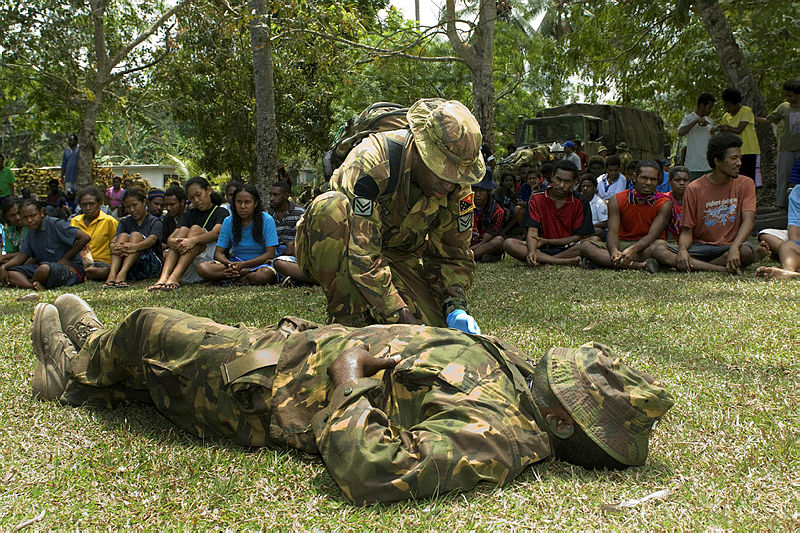
On 9 May, a senior inspector of the Royal Papua New Guinea Constabulary was brutally murdered in suburban Port Moresby. His alleged assailants were a small group of drunken off-duty members of the PNG Defence Force, one a commissioned officer.
Within hours, more than 40 police vehicles were being driven around the capital with sirens blazing. This tense situation could have descended rapidly into widespread lawlessness and social upheaval, but that was avoided largely through the effective intervention of senior police and military officers working together. Still, tensions remain.
There’s a worrying history in PNG of differences between the police and the military spilling over into violent confrontations. That’s compounded by the sometimes lawless behaviour of members of both forces.
The lack of discipline in the three major security organisations—the police, the military and the prison service—is well known and not the direct fault of the current government.
It has been a critical and unaddressed problem for most of the post-independence period. The politics of PNG sadly does not lend itself to reform of these forces, or to the proper payment of personnel.
With the PNG economy in dire straits, the full impact of the Covid-19 pandemic yet to be felt, and national elections two years away, the organisations that are so central to maintaining law and order are being worryingly neglected.
The tragic incident on 9 May is just the latest reminder that indiscipline within the ‘disciplined’ forces poses one of the greatest threats to stability, and democracy, in our closest neighbour. Australia should be concerned.
Since independence, we’ve provided development assistance to the PNG forces, mainly in training, but also in some equipment and other resourcing areas. The total this financial year exceeds $600 million, and that doesn’t include the soft loan of almost $400 million supporting PNG’s 2020 budget. It’s our largest bilateral assistance program with any country.
Support for defence, police and correctional services represents a comparatively small proportion of that extensive program.
In the prevailing fiscal and economic environment, Australia’s overseas aid programs will be under serious pressure. Hopefully, the Pacific ‘step-up’ program will prevent our regional assistance from being significantly reduced.
But the program needs to be urgently and significantly restructured, especially when it comes to our assistance to PNG. We need to put even greater emphasis on people-to-people engagement that enhances the living standards of the 8.5 million men, women and children of PNG.
But even more urgently, Australia needs to engage seriously with PNG on rebuilding the nation’s security forces.
Given that we were the colonial power before PNG gained independence in 1975, a significant role in rebuilding its forces will need to be managed diplomatically, but the state of these vital institutions gives it absolutely urgency.
The PNG budget has no spare capacity to fund what needs to be a multimillion-dollar upgrade to police, defence and prison facilities, let alone to ensure that personnel are properly paid. There’s no doubt that underfunding has contributed to a serious breakdown in discipline and performance over many years.
But the problem isn’t just a lack of funding. The training capacity within the forces is just about zero, and the wider government structure isn’t conducive to finding solutions.
There are many good people in all three forces, operating in a demanding and hazardous environment without adequate resources such as weaponry, communications equipment and accommodation.
A substantial rebuilding, resourcing and morale-boosting program funded by Australia—and sensitively administered by leaders and members of our own disciplined forces—would be welcomed by the vast majority of PNG’s defence, police and prison service officers and rank-and-file members.
The PNG Defence Force is comparatively small. The police force is much larger and more decentralised. The prison service is also decentralised.
Any Australian offer to rebuild these forces needs to be proportional. It would be dangerous to provide significantly more assistance to one over the others, especially in the case of the military and the police.
Our program needs to be people based and should not just be aimed at the leadership group. It must target the needs of rank-and-file personnel who have been victims of underfunding and poor administration.
To deliver desperately needed improvements, an annual commitment of at least $200 million would be an absolute minimum. If savings have to be made in other areas, that won’t be difficult. Far too much of the existing funding doesn’t get to PNG’s rural majority.
Some funding needs to go immediately into rebuilding and expanding facilities, barracks, police stations and prisons. That should be undertaken by Australian contractors with PNG partners.
But the greatest funding priority must be to basic training for defence, police and prison personnel. Much of it should be given in our own excellent training institutions, our defence bases and police training colleges.
PNG is facing many challenges, and Australia cannot possibly hope to solve them all. But our national interest is surely best served by our closest neighbour having disciplined and well-trained defence, police and prison services.
PNG’s need is great and growing. We really do need to step up to help meet it.

